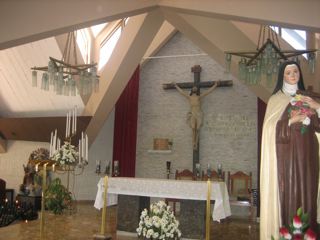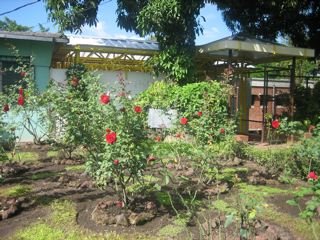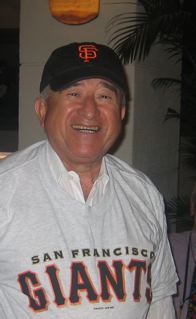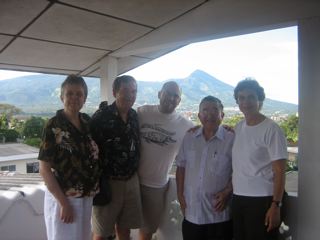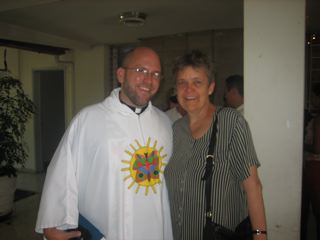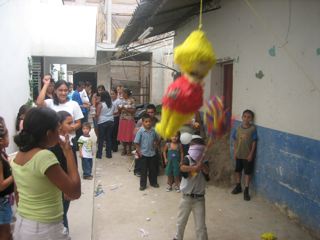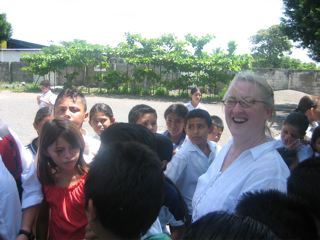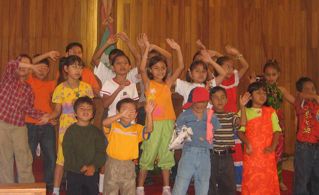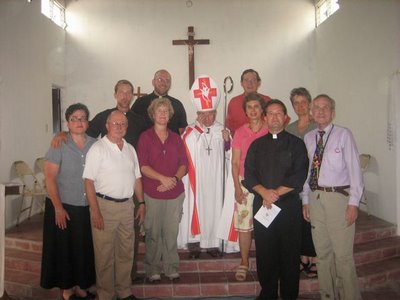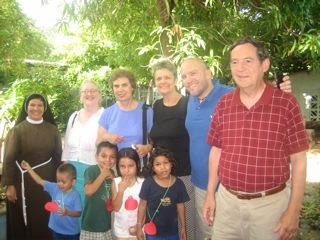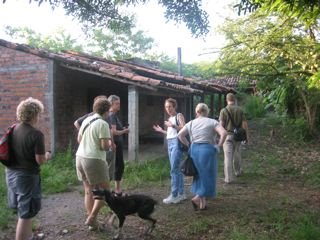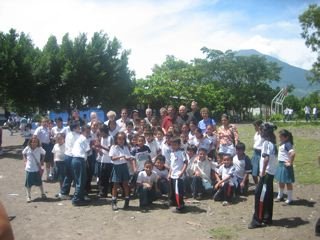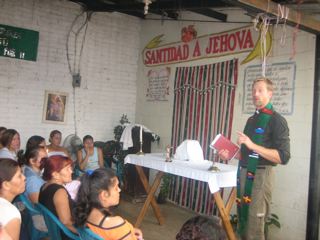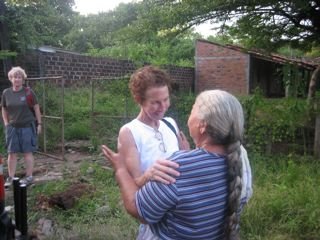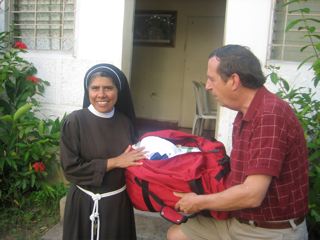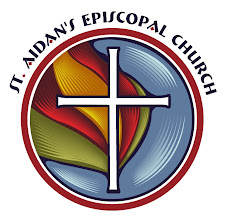Alan Wali
To Archbishop James/Charles Dalton
14th December 2006
REPORT ON LATE BR. JUSTUS VAN HOUTEN’S DEATH
INTRODUCTION
The report here is to present the fact report on the instant death of late Brother Justus. I first knew late Brother Justus in 2004 when we were together, when he was a lecturer and I as a student at Newton Theological College. This report will present the life story of the pleasant trip to my own Parish (Koinambe).
The story begins at the departure from Popondetta and ends at his instant death at my village (Kompiai). Everything said in this report is the facts and what I as a very close witness and a student and a good beloved friend of late Brother Justus.
DEPARTURE AT POPONDETTA (NEWTON COLLEGE)
Our actual day of leaving or left Newton College for visiting my Diocese and particularly my Parish (Koinambe) was on Wednesday 6th December. He had just arrived from Port Moresby a day before we began our trip. After leaving Newton College I found out that he had hard cough and a sore throat.
He actually mentioned to me that he had hard cough and a sore throat after his recent trips from New Zealand and coming to and from Port Moresby for the College Council Meeting.
However, we left Popondetta on the 6th December for Mt. Hagen. We had to fly from Girna to Port Moresby, changed the flight and we caught another flight to Mt. Hagen. We stayed two nights and a day in Hagen. The cough and sore throat in him doesn’t change. During our staying in Hagen we were given The Mepang Missionary home to overnight there two nights.
While we were in Hagen on Thursday I showed him the city in actually taking a walk, just around the central part of the city or township only for sight viewing, because this is his first time to the Province (WHP) and the Highlands.
MT. HAGEN TO KOINAMBE PARISH
On the 8th December, we flew by MAF to Koinambe, where we met The Parish Priest (Fr. Nicholas Kaam), all the church leaders and the Christians fully dressed in customs and welcomed us from the airstrip to the Parish Hall for refreshment and rest.
There were lots of greetings and joy with tears from the Christians in receiving us. We rested the whole day after arrival on Friday at the Parish. We stayed with the Parish priest for three days, which were: Friday, Saturday and Sunday.
On Saturday I took him around the station for sight viewing and visited the school, Parish itself and the health Centre. One thing we did while at Koinambe for this three days was visiting and praying for the patient at the Health Centre. That reminds me of how Br. Justus love to serve and care for the soul of others in the ministry he was called to serve.
On Sunday 10th December we had a very spectacular service. Late Br. Justus was told to take the Gospel reading and preached. In his preaching all done in Pidgin, I can remember and recall one thing he mention in Pidgin that “Yumi Mas Redi Long Kambek Bilong Jesus Long Laip Bilong Yumi “ This phrase in his preaching in Pidgin meant that we must be prepare and ready for the Lord coming in our lives today.
Anyway we ended the Sunday service with speeches, ‘bungka’ and presentation of items. Then we stayed overnight the last night at the Parish St. Johns the Baptist Parish at Koinambe.
KOINAMBE TO KOMPIAI AND MENGIK
On Monday 11th December we had to take our walk from Parish to Kompiai which is another out station. We started the journey at 7.30 am and reached to the village at 4.00 pm in the afternoon. Christians and the leaders both the church and the community welcomed us with refreshment and rest. After our arrival at Kompiai I found out about his cough and sore throat that it got worse.
On Tuesday morning I told him that we should stop at Kompiai and not to go further to Mengik, but he insisted and mentioned that we should finish the trip. So, we went over to Mengik on the 12th December started the journey at 7.30 am but it took us a while or a day before reaching the village. At Mengik he cannot say or do anything because he was very tired and very weak after the walk, not only that was the cause but also the hard cough and sore throat. And eventually he was having a complication of breathing and the symptom of the case grew worse and in the same night he had diarrhea. I have to nurse him all night with the help from community up until Wednesday morning.
In the early hours on Wednesday I told the Christians to make a stretcher so we will carry him to the near Health Centre, which is at Koinambe. So we carry him on the local made stretcher left at Mengik at 9.00 am and carry him all the way and just reaching Kompiai my own family village Late Brother Justus had passed away at 1.00 pm in front of my Christian community and me his own student and his brother.
I would like to recall the last words from Late Br. Justus Van Houten “ Adam my brother, this is the end of my ministry in Christ. Our visiting here at your Parish is not a waste, but we fulfill the ministry that we are called to do in Jesus, Thank you “
Then as I have said he took the last breath and end of his life at 1.00 pm at Kompiai, my own village.
After his death or he has passed away the Christians continually carry the body all the way down to Koinambe for chopper lift to Mt. Hagen. The information about his death gone through the VHF Radio to be air broadcast to the Anglican Church of Papua New Guinea. We carry the body down to Koinambe and it took us one and half hour, and we finally put the body on the chopper lift. We arrived in Mt. Hagen at 5.00 pm and took the body straight to the morgue with the help from Diocesan Staff here at Mt. Hagen.
Now to be honest in my report about the instant death of Late Brother Justus SSF is from the hard cough and the sore throat and as a result of those that final night at Mengik the problem grew bigger and also that night he had diarrhea. His death was end with very high breathing symptoms, meaning that he had pneumonia or what we call sort win in Pidgin.
Written by
Student – Adam Wali
Close witness
, Adam Wali
Sunday, December 31, 2006
Sunday, December 17, 2006
Come, O Come, Emmmanuel
Tommy Dillon
A Devotional
This Advent thing is so strange. We await the birth of the one who came to bring us peace, but we can’t stop to breathe because we’re rushing around like lunatics buying stuff, preparing family dinners, and stressing out in general. If this supposed to be a sacred time, what’s with all the commercialism and the stress? Where did this conflicting behavior about this season come from? I have a theory.
In 354 A.D. the Church set December 25th as the birth date of Jesus, intending to Christianize the Roman date of the Winter Solstice. Solstice literally means standing-still-sun, and it is the day of the year when the night is longest and the day shortest. December 25th was also the date of the supposed virgin birth of Mithras, the ancient Zoroastrian god of light popular with Roman soldiers.
Solstice celebrations are historically attested back as far as 4,000 B.C. in most cultures, especially those where winter is harsh. They have common elements of feasting, gift-giving, celebration, bonfires, candles, evergreens…and anticipation. Further, the ancients carried a deep-seated anxiety that spring would not come, and to assuage this apprehension, they developed rituals to please the gods they believed controlled such matters. Later, Christian leaders endeavored to attract pagans to the faith by adding Christian meaning to these existing festivals.
What does all of this have to do with us at Advent in 2006? My theory is that the overlaying of a Christian tradition onto millennia of pagan ritual has contributed to a clash of the sacred and the secular that we may never overcome. Further, since this odd anxiety is so deeply rooted in the human psyche, there is no escaping this primal angst as our nights grow longer.
The Good News is that we as Christians recognize the symbolism of who this waiting is for. We anticipate the birth of the one who came to deliver the world from its separation from God. We call it Advent, and so, in whatever emotional state we find ourselves, we joyfully wait.
=
A Devotional
This Advent thing is so strange. We await the birth of the one who came to bring us peace, but we can’t stop to breathe because we’re rushing around like lunatics buying stuff, preparing family dinners, and stressing out in general. If this supposed to be a sacred time, what’s with all the commercialism and the stress? Where did this conflicting behavior about this season come from? I have a theory.
In 354 A.D. the Church set December 25th as the birth date of Jesus, intending to Christianize the Roman date of the Winter Solstice. Solstice literally means standing-still-sun, and it is the day of the year when the night is longest and the day shortest. December 25th was also the date of the supposed virgin birth of Mithras, the ancient Zoroastrian god of light popular with Roman soldiers.
Solstice celebrations are historically attested back as far as 4,000 B.C. in most cultures, especially those where winter is harsh. They have common elements of feasting, gift-giving, celebration, bonfires, candles, evergreens…and anticipation. Further, the ancients carried a deep-seated anxiety that spring would not come, and to assuage this apprehension, they developed rituals to please the gods they believed controlled such matters. Later, Christian leaders endeavored to attract pagans to the faith by adding Christian meaning to these existing festivals.
What does all of this have to do with us at Advent in 2006? My theory is that the overlaying of a Christian tradition onto millennia of pagan ritual has contributed to a clash of the sacred and the secular that we may never overcome. Further, since this odd anxiety is so deeply rooted in the human psyche, there is no escaping this primal angst as our nights grow longer.
The Good News is that we as Christians recognize the symbolism of who this waiting is for. We anticipate the birth of the one who came to deliver the world from its separation from God. We call it Advent, and so, in whatever emotional state we find ourselves, we joyfully wait.
=
Sunday, December 03, 2006
The Funnest Event of the Season
Nancy Sabin-Hinds
THE DANCE-ALONG NUTCRACKER
Some St. Aidan's members will be attending the Sunday, December 10th
3:00 performance of the Dance-Along Nutcracker, performed by the San
Francisco Lesbian/Gay Freedom Band at the Yerba Buena Center for the
Arts (YBCA). This is a REALLY fun holiday event where every other piece
is a Nutcracker song to which the whole audience is invited dance along.
Some folks sit it out and watch, while others, all ages, dance, prance
and twirl their hearts out, wearing any version of a tutu or tiara that
they can find! Anyone interested in going, please go to the website at
http://www.sflgfb.org/dancealong.html and purchase tickets. Let Nancy
Sabin Hinds nancy_hinds@sbcglobal.net know that you are attending, and we will either arrange to meet there, or possibly carpool (maybe grab lunch together before going?)
While you are at the sflgfb website, look at the videos of past
performances. The 2004 one shows Michaela Hinds at age 3 in a black
tutu, being dragged around Nancy's feet, right after the baton twirler,
at ~1:35 into the clip. And the article under the section titled "The
Show," refers to "the woman in Nutcracker drag who led the full audience
in the march of the soldiers..." That was Nancy Sabin in 1997 (tights
stuffed with a sock in the crotch, nutcracker jacket that has since been
worn by David Franquist a few times as circus ringleader, fake mustache
and nutcracker hat, and a spatula in place of the usual sword.)
This is possibly the most fun holiday event, if not the silliest.
Love, Nancy
THE DANCE-ALONG NUTCRACKER
Some St. Aidan's members will be attending the Sunday, December 10th
3:00 performance of the Dance-Along Nutcracker, performed by the San
Francisco Lesbian/Gay Freedom Band at the Yerba Buena Center for the
Arts (YBCA). This is a REALLY fun holiday event where every other piece
is a Nutcracker song to which the whole audience is invited dance along.
Some folks sit it out and watch, while others, all ages, dance, prance
and twirl their hearts out, wearing any version of a tutu or tiara that
they can find! Anyone interested in going, please go to the website at
http://www.sflgfb.org/dancealong.html and purchase tickets. Let Nancy
Sabin Hinds nancy_hinds@sbcglobal.net know that you are attending, and we will either arrange to meet there, or possibly carpool (maybe grab lunch together before going?)
While you are at the sflgfb website, look at the videos of past
performances. The 2004 one shows Michaela Hinds at age 3 in a black
tutu, being dragged around Nancy's feet, right after the baton twirler,
at ~1:35 into the clip. And the article under the section titled "The
Show," refers to "the woman in Nutcracker drag who led the full audience
in the march of the soldiers..." That was Nancy Sabin in 1997 (tights
stuffed with a sock in the crotch, nutcracker jacket that has since been
worn by David Franquist a few times as circus ringleader, fake mustache
and nutcracker hat, and a spatula in place of the usual sword.)
This is possibly the most fun holiday event, if not the silliest.
Love, Nancy
Monday, November 27, 2006
Some News from Panama
Kenny King
Dear Brothers and Sisters in Christ:
It is our hope that this note catches you in preparation for Christ the King Sunday and the onset of Advent. It is also a approaching time for the celebration of my ordination to the Sacred Order of Priests in the Anglican / Episcopal Communion. Please join with me on November 30th (St. Andrew's Feast Day) as I continue to rededicate myself to the calling that God has placed before me.
Also this week, please keep me in your prayers, as I have moved to accept a new position in the Diocese of Panama. At the request of the Bishop of Panama, the People of God here in the Provence of Bocas del Toro, and with the grace of God; I am accepting the position of Provencal over the parishes of this region. My new responsibilities will be for the spiritual direction and shepherd for Santa Maria de Virgen, Isla Colon, Bocas Town; St. Jorge's Episcopal Church, Almirante; Transfiguration Episcopal Church, Changrinola; St. Michael's, Guiabito and various preaching stations throughout the Provence. I will be traveling from our home in Almirante throughout the ensuing weeks preaching, celebrating the Eucharist and offering the sacraments to these various communities; and overseeing the operations of these parishes and stations in their day to day activities. Pray for me that I may receive the guidance, wisdom and knowledge to give the People of God the Good News of the Gospel of Christ.
Our lives continue to be extremely busy, as we have had two funerals in the last week and I celebrate the Blessing of a Marriage on December 7th. God continue to grow the Church in this area and the English Only Service begun on Isla Colon now has a regular attendance of North Americans and European Citizens. We continue to be amazed at the grace of God in this ministry.
Our struggles continue as we call the "powers that be" to accountability for their treatment of workers and people of this Provence. We make little, but steady progress, as these powers continue to oppress a people who have little hope for the future of their children. Often now, in the beginning of our rainy season, we struggle for lights and water. When we have two to three boats in port, we loose all power and water so the ships can be supplied by the company. The Company has little regard for life here, and we seem to be a expendable community as we try to educate the children without lights for study at night, water to bathe in or clean dishes or clothes with. Yet there are communities around us that do not have even these basis necessities, mostly the indigenous populations. Pray that God will soften the hearts of the "powers that be" and give them a concern for their fellow human brothers and sisters.
May God continue to Bless and Keep you in your individual ministries and in the work of our beloved parish family. We miss you all greatly and our prayers continue to support you in the work that God has set before you.
Many Blessings,
Fr. Kenny Ryan-King, and Oonagh
Your Missionaries in Panama
"All that is necessary for evil to succeed is for good men to do nothing." Sir Edmund Burke
Dear Brothers and Sisters in Christ:
It is our hope that this note catches you in preparation for Christ the King Sunday and the onset of Advent. It is also a approaching time for the celebration of my ordination to the Sacred Order of Priests in the Anglican / Episcopal Communion. Please join with me on November 30th (St. Andrew's Feast Day) as I continue to rededicate myself to the calling that God has placed before me.
Also this week, please keep me in your prayers, as I have moved to accept a new position in the Diocese of Panama. At the request of the Bishop of Panama, the People of God here in the Provence of Bocas del Toro, and with the grace of God; I am accepting the position of Provencal over the parishes of this region. My new responsibilities will be for the spiritual direction and shepherd for Santa Maria de Virgen, Isla Colon, Bocas Town; St. Jorge's Episcopal Church, Almirante; Transfiguration Episcopal Church, Changrinola; St. Michael's, Guiabito and various preaching stations throughout the Provence. I will be traveling from our home in Almirante throughout the ensuing weeks preaching, celebrating the Eucharist and offering the sacraments to these various communities; and overseeing the operations of these parishes and stations in their day to day activities. Pray for me that I may receive the guidance, wisdom and knowledge to give the People of God the Good News of the Gospel of Christ.
Our lives continue to be extremely busy, as we have had two funerals in the last week and I celebrate the Blessing of a Marriage on December 7th. God continue to grow the Church in this area and the English Only Service begun on Isla Colon now has a regular attendance of North Americans and European Citizens. We continue to be amazed at the grace of God in this ministry.
Our struggles continue as we call the "powers that be" to accountability for their treatment of workers and people of this Provence. We make little, but steady progress, as these powers continue to oppress a people who have little hope for the future of their children. Often now, in the beginning of our rainy season, we struggle for lights and water. When we have two to three boats in port, we loose all power and water so the ships can be supplied by the company. The Company has little regard for life here, and we seem to be a expendable community as we try to educate the children without lights for study at night, water to bathe in or clean dishes or clothes with. Yet there are communities around us that do not have even these basis necessities, mostly the indigenous populations. Pray that God will soften the hearts of the "powers that be" and give them a concern for their fellow human brothers and sisters.
May God continue to Bless and Keep you in your individual ministries and in the work of our beloved parish family. We miss you all greatly and our prayers continue to support you in the work that God has set before you.
Many Blessings,
Fr. Kenny Ryan-King, and Oonagh
Your Missionaries in Panama
"All that is necessary for evil to succeed is for good men to do nothing." Sir Edmund Burke
Searching
Tommy Dillon
A Devotional
A friend of mine has recently had a string of bad dates. In fact they have been so bad, that it caused him to sit down one night and compose a “Dating Creed” and then email it to a group of friends and family. There are 14 points to his creed, but it’s the fourth tenet of his creed that has continuously played in my mind. It reads:
“If you can look around at this planet and still not believe in God,
then you are not the right person for me.”
A holiday can summon a variety of feelings. There are memories of holidays past that no longer represent the way life is now. There are memories of those who will no longer gather around the table with us. There are memories of strained family relationships. However, there is also hope found in the holidays. There is the excitement of a new tradition. There is the excitement of new relationships. There is the excitement of pain overcome.
CNN recently reported that this year Americans will spend $750 million on self-help books, more than $1 billion on motivational speakers and there are more than 100 colleges now offer classes in positive psychology - the science of happiness. The reality is that we are a people in search of happiness looking in many places. Perhaps we need look no further than the world around us. We see God at work in those who will feed the hungry today. We see God at work in the gift of a new life. We see God at work with those who have stood by us in difficult times. If you are struggling today to find what you should be thankful for, I invite you to look, really look, and find where God is at work. My guess is that there are things surrounding you in which to give thanks for. My prayer is that we can find the words to give thanks. This holiday season, I invite you to try Hope for the Holidays.
A Devotional
A friend of mine has recently had a string of bad dates. In fact they have been so bad, that it caused him to sit down one night and compose a “Dating Creed” and then email it to a group of friends and family. There are 14 points to his creed, but it’s the fourth tenet of his creed that has continuously played in my mind. It reads:
“If you can look around at this planet and still not believe in God,
then you are not the right person for me.”
A holiday can summon a variety of feelings. There are memories of holidays past that no longer represent the way life is now. There are memories of those who will no longer gather around the table with us. There are memories of strained family relationships. However, there is also hope found in the holidays. There is the excitement of a new tradition. There is the excitement of new relationships. There is the excitement of pain overcome.
CNN recently reported that this year Americans will spend $750 million on self-help books, more than $1 billion on motivational speakers and there are more than 100 colleges now offer classes in positive psychology - the science of happiness. The reality is that we are a people in search of happiness looking in many places. Perhaps we need look no further than the world around us. We see God at work in those who will feed the hungry today. We see God at work in the gift of a new life. We see God at work with those who have stood by us in difficult times. If you are struggling today to find what you should be thankful for, I invite you to look, really look, and find where God is at work. My guess is that there are things surrounding you in which to give thanks for. My prayer is that we can find the words to give thanks. This holiday season, I invite you to try Hope for the Holidays.
Monday, November 20, 2006
Baby Shower Dec. 3
Debbie Nocero
St. Aidan’s is Hosting a Baby Shower for St. Luke's Hospital
On Sunday, December 3rd at coffee hour
What better way to begin Advent than planning for a child! St. Luke=s Hospital Auxiliary keeps a layette closet of baby gifts for needy moms. Churches around the diocese help keep it filled by hosting baby showers throughout the year. Some moms really need a boost when they are feeling exhausted after giving birth and are facing financial problems ahead. Some are homeless or have special needs, for example, preemies need preemie-sized clothing. When we receive requests from the social workers, the Auxiliary happy to be able to provide a bit of tender loving care for these families and the moms are so grateful to receive some much needed items for their babies.
All items need to be practical and easily washable. Colors are needed for both boys and girls, as well as unisex or bright ones. Our Auxiliary members will put the items together and make an attractive package for the mom, tied with ribbons and a card.
All babies deserve to feel welcomed into this world - with a little help from us.
Needed Baby Items
Receiving blankets
Blankets
Nightgowns
Warm sleepers
Pajamas
Undershirts, Onesies
Disposable diapers
Bibs
Booties, socks
Outer clothing
Sweaters
Hats
Preemie-sized clothing
Baby towels
Wash cloths
Baby wipes
Pacifiers
Burp cloths
Please join us for the festivities!
St. Aidan’s is Hosting a Baby Shower for St. Luke's Hospital
On Sunday, December 3rd at coffee hour
What better way to begin Advent than planning for a child! St. Luke=s Hospital Auxiliary keeps a layette closet of baby gifts for needy moms. Churches around the diocese help keep it filled by hosting baby showers throughout the year. Some moms really need a boost when they are feeling exhausted after giving birth and are facing financial problems ahead. Some are homeless or have special needs, for example, preemies need preemie-sized clothing. When we receive requests from the social workers, the Auxiliary happy to be able to provide a bit of tender loving care for these families and the moms are so grateful to receive some much needed items for their babies.
All items need to be practical and easily washable. Colors are needed for both boys and girls, as well as unisex or bright ones. Our Auxiliary members will put the items together and make an attractive package for the mom, tied with ribbons and a card.
All babies deserve to feel welcomed into this world - with a little help from us.
Needed Baby Items
Receiving blankets
Blankets
Nightgowns
Warm sleepers
Pajamas
Undershirts, Onesies
Disposable diapers
Bibs
Booties, socks
Outer clothing
Sweaters
Hats
Preemie-sized clothing
Baby towels
Wash cloths
Baby wipes
Pacifiers
Burp cloths
Please join us for the festivities!
Sunday, November 12, 2006
Laughter is a Gift from God
Tommy Dillon
A Devotional
One of the things I love about working at St Aidan's is that our staff loves to laugh. If you were to spend the day in our office, you would definitely hear laughter coming from every corner of the building. It’s wonderful, refreshing and most definitely contagious. Sally, Diana, and I laugh much of the time!
time!
I believe that laughter is a gift from God. In Rick Coram book, It Feels Better When I Laugh, he says this about laughter, “The Great Physician has prescribed laughter as a medicine that is good for us. The happiest place in the community ought to be the place where the body of Christ assembles and celebrates. Of course, there is a time for reverence and quiet. But it is wonderful when the joy of the Lord overflows from the cup and runs into the saucer!
A couple of years ago In my former parish in Baton Rouge. One Sunday morning a bitter old man that looked like he hadn’t smiled in years came up to me and told me that he believed that laughter in the church was offensive to God. With a smile on my face, I replied, “I don’t think laughter offends God, I believe scowling, sneering Christian do.”
So, did Jesus laugh? Of course, because he shared in our humanity. More than this, I believe Jesus engineered laughter from the situations he created and spoke into. And look at the people He hung out with. In particular one of Jesus’ closest friends, the gruff fisherman from Galilee called Peter must surely have kept Jesus in stitches. He got himself into all kinds of trouble: he had a stab at walking on water but soon found out he couldn’t do it as well as Jesus could. On another occasion, having caught no fish all night Peter agreed to the ludicrous suggestion from Jesus to put his net out in deep water, only to catch so many fish that his boat began to sink. Most memorably, at the Transfiguration where Jesus stood in shining light with the prophets Moses and Elijah a dumbstruck Peter made the off-the-wall suggestion to set up three tents for them to stay the night in. I’m sure he teased about this for a long time afterwards.
Always remember to laugh!!!
A Devotional
One of the things I love about working at St Aidan's is that our staff loves to laugh. If you were to spend the day in our office, you would definitely hear laughter coming from every corner of the building. It’s wonderful, refreshing and most definitely contagious. Sally, Diana, and I laugh much of the
 time!
time!I believe that laughter is a gift from God. In Rick Coram book, It Feels Better When I Laugh, he says this about laughter, “The Great Physician has prescribed laughter as a medicine that is good for us. The happiest place in the community ought to be the place where the body of Christ assembles and celebrates. Of course, there is a time for reverence and quiet. But it is wonderful when the joy of the Lord overflows from the cup and runs into the saucer!
A couple of years ago In my former parish in Baton Rouge. One Sunday morning a bitter old man that looked like he hadn’t smiled in years came up to me and told me that he believed that laughter in the church was offensive to God. With a smile on my face, I replied, “I don’t think laughter offends God, I believe scowling, sneering Christian do.”
So, did Jesus laugh? Of course, because he shared in our humanity. More than this, I believe Jesus engineered laughter from the situations he created and spoke into. And look at the people He hung out with. In particular one of Jesus’ closest friends, the gruff fisherman from Galilee called Peter must surely have kept Jesus in stitches. He got himself into all kinds of trouble: he had a stab at walking on water but soon found out he couldn’t do it as well as Jesus could. On another occasion, having caught no fish all night Peter agreed to the ludicrous suggestion from Jesus to put his net out in deep water, only to catch so many fish that his boat began to sink. Most memorably, at the Transfiguration where Jesus stood in shining light with the prophets Moses and Elijah a dumbstruck Peter made the off-the-wall suggestion to set up three tents for them to stay the night in. I’m sure he teased about this for a long time afterwards.
Always remember to laugh!!!
All Saints' Day
Kirstin Paisley
Sermon from Sunday, November 5, 2006
Matthew 5:1-12
Wow. It’s All Saints Day. It’s fall in California!
This is the day when we remember all who came before us.
We praise famous, and not-so-famous, people.
We think about what it means to honor them, with our lips and in our lives.
People jump into our minds at odd moments,
and we wish them happiness and love.
We send out a quick thank-you for the ones we love,
as we go back to studying or washing the dishes.
We might notice a grandparent in a child’s smile.
We remember, in turn, who we are,
whose we are,
and how we are called to live.
The first record of a feast set aside to commemorate all the saints
dates from before the year 270,
in a work by Gregory the Wonder-Worker, a bishop in Greece.
The date was fixed to November 1 in the eighth century.
This is our way of honoring our ancestors.
We’ve been doing it for a very long time.
What is a saint?
Is it someone who lived a legendarily perfect life,
and died centuries ago in the service of the faith?
Is it someone about whom we tell miracle stories?
Is it the statue under the birdbath in the yard?
The catechism in the Book of Common Prayer says this about sainthood:
“The communion of saints is the whole family of God,
the living and the dead, those whom we love and those whom we hurt,
bound together in Christ by sacrament, prayer, and praise.”
Saints are the faces on the icons,
and the names forgotten centuries ago.
Theirs are the stories we tell once a year on their feast days,
and the stories remembered only by their children.
We are the babies of the family.
Ours is an ancient line of love and faith,
seeking and finding,
wrestling with and celebrating God.
This is a time to honor our own pantheons,
as well as those individuals specifically mentioned by the church.
Not only Aidan, monk, missionary bishop, and generous soul,
but Dymphna—patron of madness and also, for us, of creative chaos,
amazing organizational skills, drag-queen nuns, and children.
Not only Francis, who loved peace, practiced radical poverty,
and kissed a leper on the street—
but all who have lived and died and worked and played
and loved in this city.
I honor friends right here, who have welcomed me, laughed with me,
taught me a new skill, and helped me through a difficult time.
I honor a woman I never knew in the town I came from,
who roused her friends to create a flock of doves out of paper mache,
old sheets, glitter, paint, and glue.
They marched in an annual street fair celebrating life,
the year before she died on Palestinian soil.
I honor her parents, who carry on Rachel’s work
and who have become good friends to me.
I honor a child I cared for when I was just out of college.
She’s a self-conscious thirteen-year-old now;
she no longer jumps into my arms when she sees me.
But she taught me more about joyful assertiveness than anyone has,
before she even turned two.
I honor Mary, the bearer of God, saying yes to wild possibility.
I honor Mary Magdalene, first, vocal, witness to the resurrected Christ.
I honor Thomas, who honored his own need to see and touch
the resurrected Christ for himself.
I honor all those who serve the San Francisco Night Ministry,
and who give their time by volunteering anywhere
in the service of God’s people and creation.
I honor those, too numerous to mention, following their faith
with thoughtful abandon,
stepping out bravely and joyfully into new ministries,
serving the God who calls us all to be our true selves.
Who do you honor today? How do they help you hear the call of God?
How do they encourage you to shine your light for others?
Saints are the holy ones, and saints are all of us. What is holiness?
Jesus said,
“Blessed are the poor in spirit, for theirs is the kingdom of heaven.”
Blessed are the ones who are not attached to material things,
or financial security,
for they will find freedom in the generosity of God.
These are the ones who can share what they have,
with others who need even more than they.
“Blessed are those who mourn, for they will be comforted.”
Blessed are those who can feel their true feelings,
who can grieve and cry without shame.
They have the courage to ask for the comfort that they need.
When others need to be held, or rocked, or listened to,
these are the ones who have the strength to give that.
“Blessed are the meek, for they will inherit the earth.”
Blessed are the ones who meet anger not with posturing and threats,
but with openhearted, unreserved love.
These are the ones who can heal the ruptures in this world.
“Blessed are those who hunger and thirst for righteousness, for they will be filled.”
Blessed are those who seek God through working for justice on this earth.
The power of God will be with them
like a mighty stream.
“Blessed are the merciful, for they will receive mercy.”
Blessed are the ones who can reach out with love and offers of forgiveness,
for they too will be loved and forgiven.
“Blessed are the pure in heart, for they will see God.”
Blessed are the ones who are not complicated by greed,
hunger for power,
or any wrong attachments.
These are the ones who can pray in silence.
These are the ones who can be still, in their bodies and souls,
and make space for the love of God to fill them.
“Blessed are the peacemakers, for they will be called children of God.”
Blessed are the ones who work to heal divisions
between all peoples of the earth.
This is the work of shalom to which God calls us;
when we do it, we live into our call to be co-creators of the Kindom.
“Blessed are those who are persecuted for righteousness’ sake, for theirs is the kingdom of heaven.”
God is with us in our hurt and fear and pain,
as much as God is with us in our joy.
God knows our deepest intentions, and God loves us immeasurably.
God “gets” who we are.
In a time when it was physically dangerous
to practice a countercultural faith,
Jesus was assuring his listeners that God was present with them,
even in their suffering.
“Blessed are you when people revile you and persecute you and utter all kinds of evil against you falsely on my account. Rejoice and be glad, for your reward is great in heaven, for in the same way they persecuted the prophets who were before you.”
The work we do here matters.
Our lives matter.
The love of God, shining through us, matters.
Shalom is a Hebrew word that means more than peace;
it means wholeness, completeness, union with one another and with God.
Our new Presiding Bishop, Katharine Jefferts Schori,
preached yesterday on what it means to embody the concept of shalom.
She said,
“The ability of any of us to enjoy shalom depends on the health of our neighbors. If some do not have the opportunity for health or wholeness, then none of us can enjoy true and perfect holiness. The writer of Ephesians implores us to maintain the unity of the Spirit in the bond of peace – to be at one in God's shalom. That is our baptismal task and hope, and unless each of the members of the body enjoys shalom we shall not live as one. That dream of God, that word of God spoken in each one of us at baptism also speaks hope of its realization.”
We are given the work of holiness at baptism,
the very moment at which we enter the communion of saints.
When we do this work,
we affirm the love, the creativity, and the reconciling power of God.
Today we celebrate the Feast of All Saints.
Our cloud of witnesses is right here with us.
Let us do the work that God has created us to do.
Let us be who God has called us to be.
We are the family of God.
Sermon from Sunday, November 5, 2006
Matthew 5:1-12
Wow. It’s All Saints Day. It’s fall in California!
This is the day when we remember all who came before us.
We praise famous, and not-so-famous, people.
We think about what it means to honor them, with our lips and in our lives.
People jump into our minds at odd moments,
and we wish them happiness and love.
We send out a quick thank-you for the ones we love,
as we go back to studying or washing the dishes.
We might notice a grandparent in a child’s smile.
We remember, in turn, who we are,
whose we are,
and how we are called to live.
The first record of a feast set aside to commemorate all the saints
dates from before the year 270,
in a work by Gregory the Wonder-Worker, a bishop in Greece.
The date was fixed to November 1 in the eighth century.
This is our way of honoring our ancestors.
We’ve been doing it for a very long time.
What is a saint?
Is it someone who lived a legendarily perfect life,
and died centuries ago in the service of the faith?
Is it someone about whom we tell miracle stories?
Is it the statue under the birdbath in the yard?
The catechism in the Book of Common Prayer says this about sainthood:
“The communion of saints is the whole family of God,
the living and the dead, those whom we love and those whom we hurt,
bound together in Christ by sacrament, prayer, and praise.”
Saints are the faces on the icons,
and the names forgotten centuries ago.
Theirs are the stories we tell once a year on their feast days,
and the stories remembered only by their children.
We are the babies of the family.
Ours is an ancient line of love and faith,
seeking and finding,
wrestling with and celebrating God.
This is a time to honor our own pantheons,
as well as those individuals specifically mentioned by the church.
Not only Aidan, monk, missionary bishop, and generous soul,
but Dymphna—patron of madness and also, for us, of creative chaos,
amazing organizational skills, drag-queen nuns, and children.
Not only Francis, who loved peace, practiced radical poverty,
and kissed a leper on the street—
but all who have lived and died and worked and played
and loved in this city.
I honor friends right here, who have welcomed me, laughed with me,
taught me a new skill, and helped me through a difficult time.
I honor a woman I never knew in the town I came from,
who roused her friends to create a flock of doves out of paper mache,
old sheets, glitter, paint, and glue.
They marched in an annual street fair celebrating life,
the year before she died on Palestinian soil.
I honor her parents, who carry on Rachel’s work
and who have become good friends to me.
I honor a child I cared for when I was just out of college.
She’s a self-conscious thirteen-year-old now;
she no longer jumps into my arms when she sees me.
But she taught me more about joyful assertiveness than anyone has,
before she even turned two.
I honor Mary, the bearer of God, saying yes to wild possibility.
I honor Mary Magdalene, first, vocal, witness to the resurrected Christ.
I honor Thomas, who honored his own need to see and touch
the resurrected Christ for himself.
I honor all those who serve the San Francisco Night Ministry,
and who give their time by volunteering anywhere
in the service of God’s people and creation.
I honor those, too numerous to mention, following their faith
with thoughtful abandon,
stepping out bravely and joyfully into new ministries,
serving the God who calls us all to be our true selves.
Who do you honor today? How do they help you hear the call of God?
How do they encourage you to shine your light for others?
Saints are the holy ones, and saints are all of us. What is holiness?
Jesus said,
“Blessed are the poor in spirit, for theirs is the kingdom of heaven.”
Blessed are the ones who are not attached to material things,
or financial security,
for they will find freedom in the generosity of God.
These are the ones who can share what they have,
with others who need even more than they.
“Blessed are those who mourn, for they will be comforted.”
Blessed are those who can feel their true feelings,
who can grieve and cry without shame.
They have the courage to ask for the comfort that they need.
When others need to be held, or rocked, or listened to,
these are the ones who have the strength to give that.
“Blessed are the meek, for they will inherit the earth.”
Blessed are the ones who meet anger not with posturing and threats,
but with openhearted, unreserved love.
These are the ones who can heal the ruptures in this world.
“Blessed are those who hunger and thirst for righteousness, for they will be filled.”
Blessed are those who seek God through working for justice on this earth.
The power of God will be with them
like a mighty stream.
“Blessed are the merciful, for they will receive mercy.”
Blessed are the ones who can reach out with love and offers of forgiveness,
for they too will be loved and forgiven.
“Blessed are the pure in heart, for they will see God.”
Blessed are the ones who are not complicated by greed,
hunger for power,
or any wrong attachments.
These are the ones who can pray in silence.
These are the ones who can be still, in their bodies and souls,
and make space for the love of God to fill them.
“Blessed are the peacemakers, for they will be called children of God.”
Blessed are the ones who work to heal divisions
between all peoples of the earth.
This is the work of shalom to which God calls us;
when we do it, we live into our call to be co-creators of the Kindom.
“Blessed are those who are persecuted for righteousness’ sake, for theirs is the kingdom of heaven.”
God is with us in our hurt and fear and pain,
as much as God is with us in our joy.
God knows our deepest intentions, and God loves us immeasurably.
God “gets” who we are.
In a time when it was physically dangerous
to practice a countercultural faith,
Jesus was assuring his listeners that God was present with them,
even in their suffering.
“Blessed are you when people revile you and persecute you and utter all kinds of evil against you falsely on my account. Rejoice and be glad, for your reward is great in heaven, for in the same way they persecuted the prophets who were before you.”
The work we do here matters.
Our lives matter.
The love of God, shining through us, matters.
Shalom is a Hebrew word that means more than peace;
it means wholeness, completeness, union with one another and with God.
Our new Presiding Bishop, Katharine Jefferts Schori,
preached yesterday on what it means to embody the concept of shalom.
She said,
“The ability of any of us to enjoy shalom depends on the health of our neighbors. If some do not have the opportunity for health or wholeness, then none of us can enjoy true and perfect holiness. The writer of Ephesians implores us to maintain the unity of the Spirit in the bond of peace – to be at one in God's shalom. That is our baptismal task and hope, and unless each of the members of the body enjoys shalom we shall not live as one. That dream of God, that word of God spoken in each one of us at baptism also speaks hope of its realization.”
We are given the work of holiness at baptism,
the very moment at which we enter the communion of saints.
When we do this work,
we affirm the love, the creativity, and the reconciling power of God.
Today we celebrate the Feast of All Saints.
Our cloud of witnesses is right here with us.
Let us do the work that God has created us to do.
Let us be who God has called us to be.
We are the family of God.
Thursday, November 02, 2006
Holy Listening
Tommy Dillon
Some of my fondest memories from childhood are of sitting with my grandmother Keet at her table in the kitchen of her Tulsa home. There was always something good to eat—pound cake with homemade butter or tomatoes from my grandfather's garden-- but even more special was a quality of attentiveness that she possessed. As she listened to my chatting about this and that, she acted as if being with me were the most important thing she could be doing at the time. She taught me that listening is an act of love.
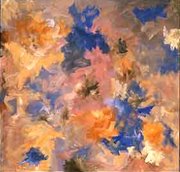
Such responsiveness is rare in our culture where we talk too much and listen too little. We all know how minimizing it is to try to share something with someone who is half-distracted, too busy or just waiting until they can get their point out. Contrastingly, how affirming it is to be with one who attends fully and respectfully to what we are saying.
The healing dimensions of being listened to are significant. Those suffering from loss or recovering from woundedness need to tell their story again and again, re-entering it, piecing together the fragments of memory. In the sacred presence of a witness, a companion who truly listens, isolation is diminished and connection to the human community is restored. Often it’s not really as much what we say in such times as a quality of caring presence. Dr. Rachel Naomi Remen suggests, “Listening creates a holy silence. When you listen generously to people, they can hear truth in themselves, often for the first time. And in the silence of listening, you can know yourself in everyone. Eventually, you may be able to hear, in everyone and beyond everyone, the unseen singing softly to itself and to you.”
The Rule of St. Benedict suggests that prayer is “listening with the ear of the heart.” He means, of course, listening for the still, small voice of God. But I believe that it is also true that we pray with one another when we hear a person’s story as sacred, when we hear with the ear of our heart.
Some of my fondest memories from childhood are of sitting with my grandmother Keet at her table in the kitchen of her Tulsa home. There was always something good to eat—pound cake with homemade butter or tomatoes from my grandfather's garden-- but even more special was a quality of attentiveness that she possessed. As she listened to my chatting about this and that, she acted as if being with me were the most important thing she could be doing at the time. She taught me that listening is an act of love.

Such responsiveness is rare in our culture where we talk too much and listen too little. We all know how minimizing it is to try to share something with someone who is half-distracted, too busy or just waiting until they can get their point out. Contrastingly, how affirming it is to be with one who attends fully and respectfully to what we are saying.
The healing dimensions of being listened to are significant. Those suffering from loss or recovering from woundedness need to tell their story again and again, re-entering it, piecing together the fragments of memory. In the sacred presence of a witness, a companion who truly listens, isolation is diminished and connection to the human community is restored. Often it’s not really as much what we say in such times as a quality of caring presence. Dr. Rachel Naomi Remen suggests, “Listening creates a holy silence. When you listen generously to people, they can hear truth in themselves, often for the first time. And in the silence of listening, you can know yourself in everyone. Eventually, you may be able to hear, in everyone and beyond everyone, the unseen singing softly to itself and to you.”
The Rule of St. Benedict suggests that prayer is “listening with the ear of the heart.” He means, of course, listening for the still, small voice of God. But I believe that it is also true that we pray with one another when we hear a person’s story as sacred, when we hear with the ear of our heart.
Sunday, October 29, 2006
50 People at the Parish Weekend
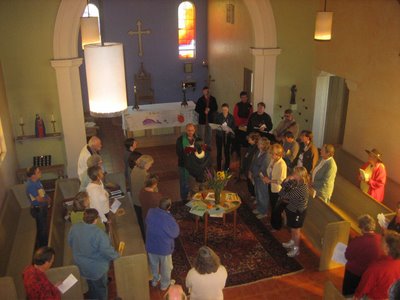 More than 50 people gathered at The Bishop’s Ranch for our annual Parish Weekend, God’s Voice, Our Stories, based on Tommy’s May 14 sermon.
More than 50 people gathered at The Bishop’s Ranch for our annual Parish Weekend, God’s Voice, Our Stories, based on Tommy’s May 14 sermon.TOMMY'S SERMON identified three ways to listen for God: immerse yourself in the Bible, give yourself to prayer, and surround yourself with spiritual friends
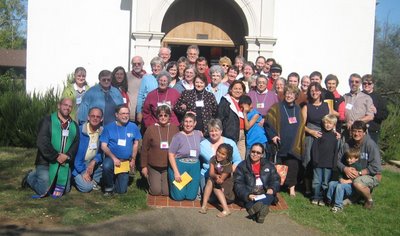
The weekend was planned by the St. Aidan’s Vocations Committee, which seeks to help people in their discernment of God’s call, both in Christian ministry and in other major life decisions—look for more information in an issue of the forthcoming St. Aidan’s newsletter.
Friday, October 27, 2006
Job and Passion
Molly Haws
Sermon from Sunday, 10/15/06
Oh, that I knew where I might find him, that I might come even to his dwelling! I would lay my case before him, and fill my mouth with arguments. I would learn what he would answer me, and understand what he would say to me. … If I go forward, he is not there; or backward, I cannot perceive him; on the left he hides, and I cannot behold him; I turn to the right, but I cannot see him.
In 6 weeks it’ll be Advent: the beginning of a new church year. We’re coming to the end of this liturgical year, and at the end of the liturgical year, we get the Book of Job.
The Book of Job is chaos. Chaos theory says we cannot predict outcomes; we cannot control external circumstance; and we will certainly never know all the permutations of the ramifications of our actions. Only God knows these things; we are not around long enough nor do we have the omniscience to see the fractal patterns undulating and unfolding. So God says to Job, “Where were you when I laid the foundation of the earth?...Have you commanded the morning since your days began, and c ause the dawn to know its place?” (38:4, 12).
ause the dawn to know its place?” (38:4, 12).
When we arrive at the end of Job’s story, what we are left with is the fundamental truth that the only thing, the only thing, over which we have any control at all is our own choices. We are free to choose. Our choices are important, they matter, not because we have any ability to affect external circumstances, but because it is by our choices that we define who we are.
What we discover along with Job is that we are not defined by our circumstances, be they good or ill. We are defined by the choices we make within those circumstances. Job, in the end, is defined by the choice he makes, over and over again, to seek God (19:23-27, 28:20-28, 30:20, 31:35-37). Job seeks God relentlessly, with tenacity and defiance and fury and pain. He seeks God with everything that he is. In the end, no persecutor, no circumstance, no calamity, no friend, no satan, nothing and no one is able to make Job do anything, or refrain from anything. He is free.
Job experienced passion. He chose to remain himself, to be affected at the deepest level, rather than trade away the definition of himself that he had forged from a lifetime of choices. Job remained vulnerable. He chose to continue to be affected, to be passionately hurt, angry, indignant, confused, desperate. Job chose to live as himself: a righteous man: one who seeks God without ceasing, not despite circumstance, not ignoring circumstance, but in the midst of circumstance.
Circumstance has loomed particularly large for me in the last few weeks: There is work to be done and I’m going to get right on it. As soon as I get back from El Salvador. No, wait, just let me get on the other side of Dymphna. Those are a couple of great big whopping circumstances, and I know you know what I’m talking about, because you’ve all had these times in your life, whether or not you went to El Salvador or are working on Dymphna, and it should not have surprised me when I told Tommy I had a hankering to talk about Job and I’d like to preach sometime while Job is in the lectionary, that he promptly offered me Dymphna Sunday.
So 2 weeks ago I’m sitting in the hotel’s Mexican restaurant in San Salvador with a margarita and my journal, feeling very, very vulnerable to circumstance, and I find myself writing these words:
“Here in El Salvador, our job—our mission—is to be affected as deeply as possible. It is a difficult mission. It is difficult because it is counter to every single bit of our identities as citizens of the USA. We are not a passive people. We are not accustomed to going forth with the intention of being acted upon. Yet that is what God calls us to do, in this time, and in this place.
Hear. Receive. Become passionate. Be acted upon. Choose.”
Wednesday night—or maybe it was Thursday, I don’t know anymore—Betsy Eddy saw me dressed in black, ripping gaff tape off a big roll and frantically taping down every cable in sight, and asked me, “Does this take you back to your college days in theatre?” I looked up and stopped for a moment. “Trust me,” I said, “this does not even remotely resemble anything I’ve ever done before.”
When I describe Dymphna to the uninitiated, I always end up saying, “It’s its own little miracle.” And it is. This thing we do here is the purest incarnation of the theatrical urge I’ve ever encountered. From the unvarnished motive of bringing in money, to the unanticipated moments of amazing grace when the perfect thing no one even thought of just happens in performance, Dymphna is what theatre is trying to be.
The rush of doing live theatre is a house full of humans who are there—who have paid money—for the express purpose of being acted upon. It’s intentional passion. In rehearsal, we are acted upon by the text. In performance, we are acted upon by the audience, who is there in order to be acted upon by us. Theatre is an exercise in incarnation. Intentional, passionate, incarnation.
And as such, it is a reflection of God’s choice to be acted upon, to become incarnate, to be affected at the deepest level, by us. God chooses passion. God chooses incarnation in the person of a Jewish boy in a Middle Eastern country that is occupied by a foreign empire, conceived outside of wedlock and born to a family of laborers, subject to all the social and political and natural and historical circumstances of place and time. Jesus didn’t even get the same caveat God gave for Job: God did not “spare his life.” Jesus was affected at the deepest possible level. Jesus was as vulnerable as it is possible to be. Jesus experienced passion so profoundly that it actually killed him.
Jesus reveals to us the truth that the power of pure passion is such that it cannot stay dead. The power of pure passion is to choose to be affected at the deepest level of who we are, while remaining who we are. The author of the epistle to the Hebrews tells us, “we do not have a high priest who is unable to sympathize with our weaknesses, but we have one who in every respect has been tested as we are, yet without sin.” Paul Tillich tells us that sin is separation. Jesus lived in the midst of circumstance and remained who he was. He was affected by circumstance, while never being changed by it: never separated—from us, from God, from himself.
Jesus’ passion—like Job’s—is a function of who he is. Truly himself and truly alive. Pure passion cannot be destroyed. Death cannot curtail and comprehend life anymore than darkness can envelope and extinguish light. Jesus’ death did not end his life. He lives. He lives within and among us. Here. Now. Whenever we gather, 2 or 3 or 40 or 90. He lives and invites us into life, into passion. And the way I know this is that I am not sitting in my living room right now saying or writing or thinking these words in isolation, for myself alone. The way I know Jesus is alive and inviting us into life and passion is that we are all here right this minute.
It’s not a command performance. It’s an invitation that comes to us with all the longing—and passion—of a lover yearning for the beloved: “Jesus, looking at him, loved him and said, ‘You lack one thing; go, sell what you own, and give the money to the poor, and you will have treasure in heaven; then come, follow me.’" Become vulnerable. Allow yourself to be affected at the deepest level. Choose passion.
Like Job, we are free to choose. We can escape some of the effects of circumstance—we can avoid being affected at the deepest level—if we are willing to be other than who we are. If we are willing to separate. We can trade away part of our selves, pieces of our souls, in order to become a person who is not affected, who is not hurt by the brokenness in the world around us, who is not vulnerable to our fellow human creatures. We can refuse passion. We can, if we so choose, do as Job’s wife advised: we can refuse to be who we are; we can turn away; we can “curse God, and die.” We have that choice. We have that choice because that is the way God created us. We can choose: passion and life—or inviolability and death. Life. Or death. We are free.
Choose.
Love,
Molly
Sermon from Sunday, 10/15/06
Oh, that I knew where I might find him, that I might come even to his dwelling! I would lay my case before him, and fill my mouth with arguments. I would learn what he would answer me, and understand what he would say to me. … If I go forward, he is not there; or backward, I cannot perceive him; on the left he hides, and I cannot behold him; I turn to the right, but I cannot see him.
In 6 weeks it’ll be Advent: the beginning of a new church year. We’re coming to the end of this liturgical year, and at the end of the liturgical year, we get the Book of Job.
The Book of Job is chaos. Chaos theory says we cannot predict outcomes; we cannot control external circumstance; and we will certainly never know all the permutations of the ramifications of our actions. Only God knows these things; we are not around long enough nor do we have the omniscience to see the fractal patterns undulating and unfolding. So God says to Job, “Where were you when I laid the foundation of the earth?...Have you commanded the morning since your days began, and c
 ause the dawn to know its place?” (38:4, 12).
ause the dawn to know its place?” (38:4, 12).When we arrive at the end of Job’s story, what we are left with is the fundamental truth that the only thing, the only thing, over which we have any control at all is our own choices. We are free to choose. Our choices are important, they matter, not because we have any ability to affect external circumstances, but because it is by our choices that we define who we are.
What we discover along with Job is that we are not defined by our circumstances, be they good or ill. We are defined by the choices we make within those circumstances. Job, in the end, is defined by the choice he makes, over and over again, to seek God (19:23-27, 28:20-28, 30:20, 31:35-37). Job seeks God relentlessly, with tenacity and defiance and fury and pain. He seeks God with everything that he is. In the end, no persecutor, no circumstance, no calamity, no friend, no satan, nothing and no one is able to make Job do anything, or refrain from anything. He is free.
Job experienced passion. He chose to remain himself, to be affected at the deepest level, rather than trade away the definition of himself that he had forged from a lifetime of choices. Job remained vulnerable. He chose to continue to be affected, to be passionately hurt, angry, indignant, confused, desperate. Job chose to live as himself: a righteous man: one who seeks God without ceasing, not despite circumstance, not ignoring circumstance, but in the midst of circumstance.
Circumstance has loomed particularly large for me in the last few weeks: There is work to be done and I’m going to get right on it. As soon as I get back from El Salvador. No, wait, just let me get on the other side of Dymphna. Those are a couple of great big whopping circumstances, and I know you know what I’m talking about, because you’ve all had these times in your life, whether or not you went to El Salvador or are working on Dymphna, and it should not have surprised me when I told Tommy I had a hankering to talk about Job and I’d like to preach sometime while Job is in the lectionary, that he promptly offered me Dymphna Sunday.
So 2 weeks ago I’m sitting in the hotel’s Mexican restaurant in San Salvador with a margarita and my journal, feeling very, very vulnerable to circumstance, and I find myself writing these words:
“Here in El Salvador, our job—our mission—is to be affected as deeply as possible. It is a difficult mission. It is difficult because it is counter to every single bit of our identities as citizens of the USA. We are not a passive people. We are not accustomed to going forth with the intention of being acted upon. Yet that is what God calls us to do, in this time, and in this place.
Hear. Receive. Become passionate. Be acted upon. Choose.”
Wednesday night—or maybe it was Thursday, I don’t know anymore—Betsy Eddy saw me dressed in black, ripping gaff tape off a big roll and frantically taping down every cable in sight, and asked me, “Does this take you back to your college days in theatre?” I looked up and stopped for a moment. “Trust me,” I said, “this does not even remotely resemble anything I’ve ever done before.”
When I describe Dymphna to the uninitiated, I always end up saying, “It’s its own little miracle.” And it is. This thing we do here is the purest incarnation of the theatrical urge I’ve ever encountered. From the unvarnished motive of bringing in money, to the unanticipated moments of amazing grace when the perfect thing no one even thought of just happens in performance, Dymphna is what theatre is trying to be.
The rush of doing live theatre is a house full of humans who are there—who have paid money—for the express purpose of being acted upon. It’s intentional passion. In rehearsal, we are acted upon by the text. In performance, we are acted upon by the audience, who is there in order to be acted upon by us. Theatre is an exercise in incarnation. Intentional, passionate, incarnation.
And as such, it is a reflection of God’s choice to be acted upon, to become incarnate, to be affected at the deepest level, by us. God chooses passion. God chooses incarnation in the person of a Jewish boy in a Middle Eastern country that is occupied by a foreign empire, conceived outside of wedlock and born to a family of laborers, subject to all the social and political and natural and historical circumstances of place and time. Jesus didn’t even get the same caveat God gave for Job: God did not “spare his life.” Jesus was affected at the deepest possible level. Jesus was as vulnerable as it is possible to be. Jesus experienced passion so profoundly that it actually killed him.
Jesus reveals to us the truth that the power of pure passion is such that it cannot stay dead. The power of pure passion is to choose to be affected at the deepest level of who we are, while remaining who we are. The author of the epistle to the Hebrews tells us, “we do not have a high priest who is unable to sympathize with our weaknesses, but we have one who in every respect has been tested as we are, yet without sin.” Paul Tillich tells us that sin is separation. Jesus lived in the midst of circumstance and remained who he was. He was affected by circumstance, while never being changed by it: never separated—from us, from God, from himself.
Jesus’ passion—like Job’s—is a function of who he is. Truly himself and truly alive. Pure passion cannot be destroyed. Death cannot curtail and comprehend life anymore than darkness can envelope and extinguish light. Jesus’ death did not end his life. He lives. He lives within and among us. Here. Now. Whenever we gather, 2 or 3 or 40 or 90. He lives and invites us into life, into passion. And the way I know this is that I am not sitting in my living room right now saying or writing or thinking these words in isolation, for myself alone. The way I know Jesus is alive and inviting us into life and passion is that we are all here right this minute.
It’s not a command performance. It’s an invitation that comes to us with all the longing—and passion—of a lover yearning for the beloved: “Jesus, looking at him, loved him and said, ‘You lack one thing; go, sell what you own, and give the money to the poor, and you will have treasure in heaven; then come, follow me.’" Become vulnerable. Allow yourself to be affected at the deepest level. Choose passion.
Like Job, we are free to choose. We can escape some of the effects of circumstance—we can avoid being affected at the deepest level—if we are willing to be other than who we are. If we are willing to separate. We can trade away part of our selves, pieces of our souls, in order to become a person who is not affected, who is not hurt by the brokenness in the world around us, who is not vulnerable to our fellow human creatures. We can refuse passion. We can, if we so choose, do as Job’s wife advised: we can refuse to be who we are; we can turn away; we can “curse God, and die.” We have that choice. We have that choice because that is the way God created us. We can choose: passion and life—or inviolability and death. Life. Or death. We are free.
Choose.
Love,
Molly
Thursday, October 12, 2006
Meditation: The Shock of Forgiveness
Tommy Dillon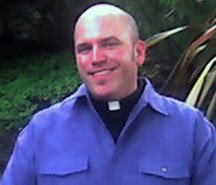
"Then Peter came and said to him, 'Lord, if another member of the church sins against me, how often should I forgive? As many as seven times?' Jesus said to him, 'Not seven times, but, I tell you, seventy-seven times.'" (Matthew 18:21-22)
Recently the world was horrified to learn of the gruesome murders that took place in a one-room schoolhouse in Nickel Mines, Pennsylvania; a small farming community west of Philadelphia. Of course, the only natural question to follow was "why?" The answer is remarkably simple, yet perhaps the most complicated answer one can offer - we don't know.
However, there was a second shock in relation to this crime; the shock of forgiveness. The world has watched the families of the young victims offer gestures and words of forgiveness toward the man who perpetuated the violence before their daughters had even been buried. Of course, the only natural question to follow was "why?" This answer is as simple and complicated too - because it is what Jesus taught us to do. In an interview late last week, one of the members of the community was asked how they could forgive and the response was "we would rather focus on the time that we had with them."
I believe that people come into our lives to teach us something. Even if only for a brief or painful time, people teach us about ourselves, about God or about human complexities. The challenge is when the people that come into our lives hurt us, and we must forgive. The question is naturally raised, "why?" The answer once again becomes - because it is what Jesus taught us to do.
Forgiveness is not glamorous nor is it easy, but it is what we as a people of faith are meant to do. It is the world that says "Hold a grudge, don't let them win!" It is Christ who says, "Forgive, so that love can win." I don't know who has caused you pain, but I know what you are called to do about it. May God give us that strength.

"Then Peter came and said to him, 'Lord, if another member of the church sins against me, how often should I forgive? As many as seven times?' Jesus said to him, 'Not seven times, but, I tell you, seventy-seven times.'" (Matthew 18:21-22)
Recently the world was horrified to learn of the gruesome murders that took place in a one-room schoolhouse in Nickel Mines, Pennsylvania; a small farming community west of Philadelphia. Of course, the only natural question to follow was "why?" The answer is remarkably simple, yet perhaps the most complicated answer one can offer - we don't know.
However, there was a second shock in relation to this crime; the shock of forgiveness. The world has watched the families of the young victims offer gestures and words of forgiveness toward the man who perpetuated the violence before their daughters had even been buried. Of course, the only natural question to follow was "why?" This answer is as simple and complicated too - because it is what Jesus taught us to do. In an interview late last week, one of the members of the community was asked how they could forgive and the response was "we would rather focus on the time that we had with them."
I believe that people come into our lives to teach us something. Even if only for a brief or painful time, people teach us about ourselves, about God or about human complexities. The challenge is when the people that come into our lives hurt us, and we must forgive. The question is naturally raised, "why?" The answer once again becomes - because it is what Jesus taught us to do.
Forgiveness is not glamorous nor is it easy, but it is what we as a people of faith are meant to do. It is the world that says "Hold a grudge, don't let them win!" It is Christ who says, "Forgive, so that love can win." I don't know who has caused you pain, but I know what you are called to do about it. May God give us that strength.
Tuesday, October 03, 2006
El Salvador: Martyrdom Sites
Monday, October 02, 2006
El Salvador: Final Log (# 5)
Final log (#5) Martyr Sites then Home
This morning we woke up and had a great breakfast at the hotel- I am loving sweet corn tamales for breakfast!
We packed up and met in the lobby to head out to the hospital where archbishop Romero lived with the nuns and where he was killed while celebrating mass. We had a tour from one of the nuns. We then went downtown to see the tomb of Romero but it is only open one hour in the afternoon in the crypt. The powers that be moved him and limit access because so many are pushing for him to be a saint but the Roman Catholic authority is trying to quiet that movement. Its great that the two statues of Romero are in Anglican/Episcopal churches one being the National Cathedral in Washington DC and Westminster Abbey in London. We toured the cathedral and went out into the square where 70 were killed by the government during Romero's funeral.
We traveled to the Univerisity of Central America which is a Jesuit school. This is where the 6 priests and two women were killed. We visited the chapel there which has amazing but graphic artwork of those beaten and killed during the civil war.
We had lunch in a shopping mall- I had McDonalds which was great!!! We then went back to the Univeristy and toured where the Jesuits were killed. It was very moving. Seeing the real pictures of the dead was shocking. We then went back to the hotel to get our luggage and head ot the airport.
It has been a great trip and now for the real work - to continue the work we have started here!
This morning we woke up and had a great breakfast at the hotel- I am loving sweet corn tamales for breakfast!
We packed up and met in the lobby to head out to the hospital where archbishop Romero lived with the nuns and where he was killed while celebrating mass. We had a tour from one of the nuns. We then went downtown to see the tomb of Romero but it is only open one hour in the afternoon in the crypt. The powers that be moved him and limit access because so many are pushing for him to be a saint but the Roman Catholic authority is trying to quiet that movement. Its great that the two statues of Romero are in Anglican/Episcopal churches one being the National Cathedral in Washington DC and Westminster Abbey in London. We toured the cathedral and went out into the square where 70 were killed by the government during Romero's funeral.
We traveled to the Univerisity of Central America which is a Jesuit school. This is where the 6 priests and two women were killed. We visited the chapel there which has amazing but graphic artwork of those beaten and killed during the civil war.
We had lunch in a shopping mall- I had McDonalds which was great!!! We then went back to the Univeristy and toured where the Jesuits were killed. It was very moving. Seeing the real pictures of the dead was shocking. We then went back to the hotel to get our luggage and head ot the airport.
It has been a great trip and now for the real work - to continue the work we have started here!
El Salvador: Sleepless in Salvador
Log 4
This morning I got up with not much sleep under my belt but we made it to the cathedral on time. Turns out that Molly was sick - she was suffering from a migraine-and had been dropped off at the cathedral. The group split up to experience different parishes around the diocese. John went to one parish and Daniel went to two parishes and I was at the Cathedral. All three of us presided at the mass in Spanish. It was a great service but Molly spent her time in the bathroom. I was happy that I didnt chop up the Spanish too badly.
After the service we went back to the hotel for a 2 hour siesta. I had a great lunch and then took a 45 minute nap. We left the hotel at 2:30 to go to the patron feast of St Michael at a church 30 minutes outside of San Salvador. It was HOT there!
Met up with the archbishop and enjoyed the service. When the bishop baptized a baby boy- He threw lots of water on the 3 year old and scared him so badly he was screaming. He said that when a baby is born a baby cries so when a baby is baptized the baby is ok to cry becase it is part of new life! I had the chance to speak to the crowd along with John and Daniel.
After the service the kids went after the pinata- A Winnie the Poo one - looked like Winnie had broken his neck! After some of us was hit by the blindfolded kids, the Poo Bear finally dropped and kids went CRAZY to get the kids. We boarded the van and headed back to San Salvador viewing a beautiful rainbow over the mountains.
This evening we met with the Archbishop at the hotel to talk about future trips and how we can all work together to further the mission in San Miguel. After the meeting was a yummy dinner in the hotel. Tomorrow is our last day where we will tour the sites having to do with the life of Archbishop Oscar Romero.
This morning I got up with not much sleep under my belt but we made it to the cathedral on time. Turns out that Molly was sick - she was suffering from a migraine-and had been dropped off at the cathedral. The group split up to experience different parishes around the diocese. John went to one parish and Daniel went to two parishes and I was at the Cathedral. All three of us presided at the mass in Spanish. It was a great service but Molly spent her time in the bathroom. I was happy that I didnt chop up the Spanish too badly.
After the service we went back to the hotel for a 2 hour siesta. I had a great lunch and then took a 45 minute nap. We left the hotel at 2:30 to go to the patron feast of St Michael at a church 30 minutes outside of San Salvador. It was HOT there!
Met up with the archbishop and enjoyed the service. When the bishop baptized a baby boy- He threw lots of water on the 3 year old and scared him so badly he was screaming. He said that when a baby is born a baby cries so when a baby is baptized the baby is ok to cry becase it is part of new life! I had the chance to speak to the crowd along with John and Daniel.
After the service the kids went after the pinata- A Winnie the Poo one - looked like Winnie had broken his neck! After some of us was hit by the blindfolded kids, the Poo Bear finally dropped and kids went CRAZY to get the kids. We boarded the van and headed back to San Salvador viewing a beautiful rainbow over the mountains.
This evening we met with the Archbishop at the hotel to talk about future trips and how we can all work together to further the mission in San Miguel. After the meeting was a yummy dinner in the hotel. Tomorrow is our last day where we will tour the sites having to do with the life of Archbishop Oscar Romero.
El Salvador: The Jungle and the Archbishop
LOG 3
We woke up in San Miguel and drove to San Salvador which was a 3 hour trip on the Pan American Highway. The views were amazing! Lush jungle and large volcanos everywhere. We were caught in traffic for a while due to a fatal truck accident. Very sad to see the dead man laying on the road with a small blanket over him. A bit of a shocker.
We checked in the hotel and then went to the Diocesan Center for the Anglican Church of El Salvador where we met with Archbishop Martin Barahona. He wanted us to have a restful day so we went to lunch at his home. It was so much fun! He and his wife Betty had lots of booze and food for us. We stayed there for about three hours laughing and telling great stories. We then went to a local market to buy Salvadoran crafts. Then back to the hotel where I was practicing my Spanish because the bishop wanted me to celebrate Mass at the cathedral.
I sounded like Gomer Pyle speaking. Then to a Mexican Restaurant in the hotel where we had tapas and maragritas. A women was singing Karaoke in the place and it was quite funny. Daniel and I then hit some local bars and discos which was a blast!
Went to bed late but it was well worth it!
We woke up in San Miguel and drove to San Salvador which was a 3 hour trip on the Pan American Highway. The views were amazing! Lush jungle and large volcanos everywhere. We were caught in traffic for a while due to a fatal truck accident. Very sad to see the dead man laying on the road with a small blanket over him. A bit of a shocker.
We checked in the hotel and then went to the Diocesan Center for the Anglican Church of El Salvador where we met with Archbishop Martin Barahona. He wanted us to have a restful day so we went to lunch at his home. It was so much fun! He and his wife Betty had lots of booze and food for us. We stayed there for about three hours laughing and telling great stories. We then went to a local market to buy Salvadoran crafts. Then back to the hotel where I was practicing my Spanish because the bishop wanted me to celebrate Mass at the cathedral.
I sounded like Gomer Pyle speaking. Then to a Mexican Restaurant in the hotel where we had tapas and maragritas. A women was singing Karaoke in the place and it was quite funny. Daniel and I then hit some local bars and discos which was a blast!
Went to bed late but it was well worth it!
Sunday, October 01, 2006
El Salvador: Prison, School, and Orphanage
Log 2
We woke up after a nice 8 hour sleep and gathered for breakfast which was YUMMY! Beans, Eggs, tortillas, plantains, and tamales. We spoke about the liturgy that would take place in the women's prison during the meal.
At the prison we all had to get searched by the guards- male to male and female to female and then we gave them our passports. We walked into the prison where we were greeted by the women who live in a courtyard during the day. We toured the area while Mother Evans prepared the altar for mass. The area looks like a chicken coop. The women make crafts to sell, hang out, wash cothes and even bake bread during the day. The stay in a dormintory setting at night. They even had a snack stand in the prison selling Pepsi products!
We gathered for the eucharist with around 40 inmates. They sang, prayed and participated fully in the service. Daniel Simons presided at the service, Molly Haws read the Gospel in Spanish and I administered the chalice to the women. Several had tears streaming down their face. We took a group picture before departing- By the way It was HOT once again. Wearing black clericals was a bit much in this weather. I would like to create cooling clergy wear- I would make a FORTUNE.
We left the prison and visited a school for young kids in a neighborhood filled with gangs. One twelve year old child had been shot four times in the chest recently due to his brother being part of a local gang at the school. The school has 1500 students. We visited a kitchen that was funded by the San Lucas Mission and then hungout with the children. The kids LOVED us- They kept on gathering around us laughing and touching us. Several of us had conversations with them trying to tell them about where we were from. We visited the computer lab that only had 15 computers- it was a great room because it had A/C.
We had lunch and then traveled to an orphanage run by the Franciscan Sisters. We gave them the goods we collected in San Francisco and toured the facilities. The kids were adorable. They were fascinated by our cameras when we would show them the pictures we had taken of them on the display.
At this point many of us were so TIRED from a long day but that was not it! We boarded the bus for a lagoon which was in a volcano crater but we got there too late. We drove to the top of the volcano where there was a town called Allegria. It was very beautiful up in the clouds and it was cool. Then the bottom dropped out and a rain storm fell from the sky. We were all soaking wet and now cold.
We had drinks until it slacked and then visted a local festival that was taking place. We drove back down the volcano to a great local restaurant where I had fajitas and we had great conversations about what we had seen during the day. We were dropped off at the hotel to retire for the night.
We woke up after a nice 8 hour sleep and gathered for breakfast which was YUMMY! Beans, Eggs, tortillas, plantains, and tamales. We spoke about the liturgy that would take place in the women's prison during the meal.
At the prison we all had to get searched by the guards- male to male and female to female and then we gave them our passports. We walked into the prison where we were greeted by the women who live in a courtyard during the day. We toured the area while Mother Evans prepared the altar for mass. The area looks like a chicken coop. The women make crafts to sell, hang out, wash cothes and even bake bread during the day. The stay in a dormintory setting at night. They even had a snack stand in the prison selling Pepsi products!
We gathered for the eucharist with around 40 inmates. They sang, prayed and participated fully in the service. Daniel Simons presided at the service, Molly Haws read the Gospel in Spanish and I administered the chalice to the women. Several had tears streaming down their face. We took a group picture before departing- By the way It was HOT once again. Wearing black clericals was a bit much in this weather. I would like to create cooling clergy wear- I would make a FORTUNE.
We left the prison and visited a school for young kids in a neighborhood filled with gangs. One twelve year old child had been shot four times in the chest recently due to his brother being part of a local gang at the school. The school has 1500 students. We visited a kitchen that was funded by the San Lucas Mission and then hungout with the children. The kids LOVED us- They kept on gathering around us laughing and touching us. Several of us had conversations with them trying to tell them about where we were from. We visited the computer lab that only had 15 computers- it was a great room because it had A/C.
We had lunch and then traveled to an orphanage run by the Franciscan Sisters. We gave them the goods we collected in San Francisco and toured the facilities. The kids were adorable. They were fascinated by our cameras when we would show them the pictures we had taken of them on the display.
At this point many of us were so TIRED from a long day but that was not it! We boarded the bus for a lagoon which was in a volcano crater but we got there too late. We drove to the top of the volcano where there was a town called Allegria. It was very beautiful up in the clouds and it was cool. Then the bottom dropped out and a rain storm fell from the sky. We were all soaking wet and now cold.
We had drinks until it slacked and then visted a local festival that was taking place. We drove back down the volcano to a great local restaurant where I had fajitas and we had great conversations about what we had seen during the day. We were dropped off at the hotel to retire for the night.
El Salvador: We're Off!
LOG 1
The group arrived at the SFO airport and flew for El Salvador at 1:30am. We arrived safely with all of our luggage and were on the road in our van for 9am. All of our luggage was in the back of another pick up truck. It was HOT and humid- very far from San Francisco weather.
We drove for two hours until we arrived San Miguel where we picked up the Rev. Elizabeth Evans who is the priest for the mission of San Lucas. We checked into our hotel and had a nice lunch introducing ourselves to Mother Evans and learned more about what we would do for our days in San Miguel. San Miguel is next to a very large volcano and is surrounded by lush tropical forrest. Its probably the hottest place in El Salvador.
We took a 1.5 hour siesta since none of us received much sleep on the plane. Once we were assembled we drove to the local public hospital where we met with the director of the hospital. We learned about the needs of the facility which are great. We viewed the mammogram x-ray machine which the mission of San Lucas helped get to the hospital. We toured the pediatric ward and gave baby clothing to nursing mothers. They were very grateful.
We then saw little Oscar who was in the pediatric ICU. He was a premature baby and was extremely small and frail. He moved many of us to tears and we met with his mother and assured her of our prayers for she and her baby boy.
We drove to the mission church of San Lucas where we toured the church center where many ministries take place- a worship space, office, classroom, housing for released inmates from the women's prison and housing for the chaplain. We saw another home of Mother Elizabeth's assistant who also offers her home for inmates on their days out from the prison.
We drove 30 minutes to the home of a 65 year old released ex offender who lived with her 90 year old mother in a home with no electricity. She was so honored that we came to visit her. Her dogs attacked one of her chickens in the yard while we were there and that became their dinner.
We drove back to San Miguel where we enjoyed a meal before retiring for the evening. Everyone is tired from the long day and night. I know I will take several showers a day while we are here. Thank God we have A/C in our hotel rooms.We get up early and head to the women's prison for 8am.
Peace,
Tommy+
The group arrived at the SFO airport and flew for El Salvador at 1:30am. We arrived safely with all of our luggage and were on the road in our van for 9am. All of our luggage was in the back of another pick up truck. It was HOT and humid- very far from San Francisco weather.
We drove for two hours until we arrived San Miguel where we picked up the Rev. Elizabeth Evans who is the priest for the mission of San Lucas. We checked into our hotel and had a nice lunch introducing ourselves to Mother Evans and learned more about what we would do for our days in San Miguel. San Miguel is next to a very large volcano and is surrounded by lush tropical forrest. Its probably the hottest place in El Salvador.
We took a 1.5 hour siesta since none of us received much sleep on the plane. Once we were assembled we drove to the local public hospital where we met with the director of the hospital. We learned about the needs of the facility which are great. We viewed the mammogram x-ray machine which the mission of San Lucas helped get to the hospital. We toured the pediatric ward and gave baby clothing to nursing mothers. They were very grateful.
We then saw little Oscar who was in the pediatric ICU. He was a premature baby and was extremely small and frail. He moved many of us to tears and we met with his mother and assured her of our prayers for she and her baby boy.
We drove to the mission church of San Lucas where we toured the church center where many ministries take place- a worship space, office, classroom, housing for released inmates from the women's prison and housing for the chaplain. We saw another home of Mother Elizabeth's assistant who also offers her home for inmates on their days out from the prison.
We drove 30 minutes to the home of a 65 year old released ex offender who lived with her 90 year old mother in a home with no electricity. She was so honored that we came to visit her. Her dogs attacked one of her chickens in the yard while we were there and that became their dinner.
We drove back to San Miguel where we enjoyed a meal before retiring for the evening. Everyone is tired from the long day and night. I know I will take several showers a day while we are here. Thank God we have A/C in our hotel rooms.We get up early and head to the women's prison for 8am.
Peace,
Tommy+
Subscribe to:
Comments (Atom)
